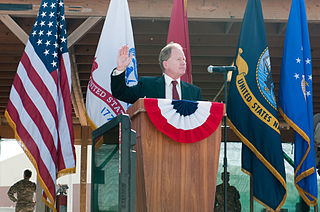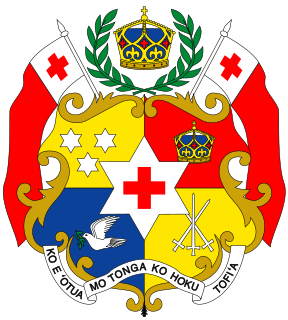Related Research Articles
An allegiance is a duty of fidelity said to be owed, or freely committed, by the people, subjects or citizens to their state or sovereign.

An oath of office is an oath or affirmation a person takes before assuming the duties of an office, usually a position in government or within a religious body, although such oaths are sometimes required of officers of other organizations. Such oaths are often required by the laws of the state, religious body, or other organization before the person may actually exercise the powers of the office or organization. It may be administered at an inauguration, coronation, enthronement, or other ceremony connected with the taking up of office itself, or it may be administered privately. In some cases it may be administered privately and then repeated during a public ceremony.

Naturalization is the legal act or process by which a non-citizen of a country may acquire citizenship or nationality of that country. It may be done automatically by a statute, i.e., without any effort on the part of the individual, or it may involve an application or a motion and approval by legal authorities. The rules of naturalization vary from country to country but typically include a promise to obey and uphold that country's laws, taking and subscribing to an oath of allegiance, and may specify other requirements such as a minimum legal residency and adequate knowledge of the national dominant language or culture. To counter multiple citizenship, most countries require that applicants for naturalization renounce any other citizenship that they currently hold, but whether this renunciation actually causes loss of original citizenship, as seen by the host country and by the original country, will depend on the laws of the countries involved.
All officers of the eight uniformed services of the United States swear or affirm an oath of office upon commissioning. It differs from that of the oath of enlistment that enlisted members recite when they enter the service. It is required by statute, the oath being prescribed by Section 3331, Title 5, United States Code. It is traditional for officers to recite the oath upon promotion but as long as the officer's service is continuous this is not required.

An oath of allegiance is an oath whereby a subject or citizen acknowledges a duty of allegiance and swears loyalty to monarch or country. In republics, modern oaths are sworn to the country in general, or to the country's constitution. For example, officials in the United States, a republic, take an oath of office that includes swearing allegiance to the United States Constitution. However, typically in a constitutional monarchy, such as in the United Kingdom, Australia and other Commonwealth realms, oaths are sworn to the monarch. Armed forces typically require a military oath.
An oath of citizenship is an oath taken by immigrants that officially naturalizes immigrants into citizens. It is often the final step in this process, and is usually done in a ceremonial capacity. An oath of citizenship is designed to be a statement of patriotism and loyalty to the new country. In countries which retain a monarchical system of government, an oath of allegiance to the monarch is often required as well. Adding an oath to God to the end of an oath is usually optional.

The Oath of Allegiance of the United States is the official oath of allegiance that must be taken and subscribed by every lawful permanent resident (LPR) who wishes to become a national of the United States (American). The only LPR who cannot take this oath of allegiance is one who is "removable" from the United States under the Immigration and Nationality Act (INA).
Nationality law is the law of a sovereign state, and of each of its jurisdictions, that defines the rights and obligations of citizenship within the jurisdiction as well as the manner in which citizenship is acquired and how it may be lost. A person who is in a country in which they are not a citizen of is generally regarded by that country as a foreigner, or alien. A person who has no recognised nationality or citizenship to any jurisdiction is regarded as stateless.

The Barbadian nationality law is governed by both the Barbados Citizenship Act and the Barbados Constitution. The Barbadian law strictly applies the principle of ius sanguinis. According to the Nationality Law, which disciplines the modes of acquiring citizenship, any person with at least one parent who is a Barbadian national shall have Barbadian nationality.

The Republic of Liberia was founded by freed African slaves from North America who were sponsored by the American Colonization Society to return to Africa and establish a colony there. Shortly after their arrival, they were met by the indigenous people that inhabited the land. The Nationality law is set forth in the Aliens and Nationality Law of 1973, based on its 1847 Constitution. Current citizenship laws explicitly state being Black as a prerequisite to citizenship. The first constitution allowed for women to transmit their nationality to their children, although multiple citizenship was not permitted nor is it permitted in revisions of the constitution.

The Pledge of Allegiance to the Philippine Flag is the pledge to the flag of the Philippines. It is one of two national pledges, the other being the Patriotic Oath, which is the Philippine national pledge.

The Philippine nationality law is based upon the principles of jus sanguinis and therefore descent from a parent who is a citizen or national of the Republic of the Philippines is the primary method of acquiring Philippine citizenship. This is contrasted with the legal principle of jus soli where being born on the soil of a country, even to foreign parents, grants one citizenship. For those born in the Philippines to non-Filipino parents, the Administrative Naturalization Law of 2000 provides a path for administrative naturalization for those who qualify.
In Australia, an Oath of Allegiance or an Affirmation of Allegiance are oaths of allegiance required to be made to the monarch of Australia in some situations. Oaths of Allegiance are usually made on a Bible, or some other book holy to the person, such as a Koran; but the person may opt to make an affirmation in lieu of an oath. Note that this oath is not the same as the Australian Citizenship Pledge which is required to be made when being naturalized as an Australian citizen.

Trinidad and Tobago passports are issued to citizens of Trinidad and Tobago for international travel; allowing the passport bearer to travel to foreign countries in accordance to stipulated visa requirements. All Trinidad and Tobago passports are issued through the Ministry of National Security, Immigration Division and are valid for a period of ten (10) years for adults, and five (5) years for children under 16. The passport is a CARICOM passport as Trinidad and Tobago is a member of the Caribbean Community.

Nationality and citizenship in the Kingdom of Tonga are currently defined and regulated by the Nationality (Amendment) Act 2007.
The visa policy of the Philippines is governed by Commonwealth Act No. 613, also known as the Philippine Immigration Act, and by subsequent legislation amending it. The Act is jointly enforced by the Department of Foreign Affairs (DFA) and the Bureau of Immigration (BI). Visitors from 157 countries are permitted visa-free entry for periods ranging from 14 to 59 days.
The Bhutanese Citizenship Act of 1958, officially the Nationality Law of Bhutan, 1958, is a decree by the Druk Gyalpo King Jigme Dorji Wangchuck, recognizing the definition of a Bhutanese citizen. The Act was amended in 1977 and then superseded by the Citizenship Act of 1985.
Multiple/dual citizenship is a legal status in which a person is concurrently regarded as a national or citizen of more than one country under the laws of those countries. Conceptually, citizenship is focused on the internal political life of the country and nationality is a matter of international dealings. There is no international convention which determines the nationality or citizenship status of a person. This is defined exclusively by national laws, which can vary and conflict with each other. Multiple citizenship arises because different countries use different, and not necessarily mutually exclusive, criteria for citizenship. Colloquially, people may "hold" multiple citizenship but, technically, each nation makes a claim that a particular person is considered its national.

Nigerian nationality law is the law of Nigeria which concerns citizenship and other categories of Nigerian nationality.

The Plantation Act 1740 or the Naturalization Act 1740 are common names used for an act of the British Parliament that was officially titled An Act for Naturalizing such foreign Protestants and others therein mentioned, as are settled or shall settle in any of His Majesty's Colonies in America.
References
- ↑ Commonwealth of the Philippines. (Enacted: June 17, 1939). Commonwealth Act No. 473 - The Revised Naturalization Law of 1939. Retrieved December 29, 2011 from the Chan Robles Virtual Law Library.
- ↑ Republic of the Philippines. (Enacted: August 29, 2003). Republic Act No. 9225 - The Citizenship Retention and Re-acquisition Act of 2003. Retrieved December 29, 2011 from the Chan Robles Virtual Law Library.